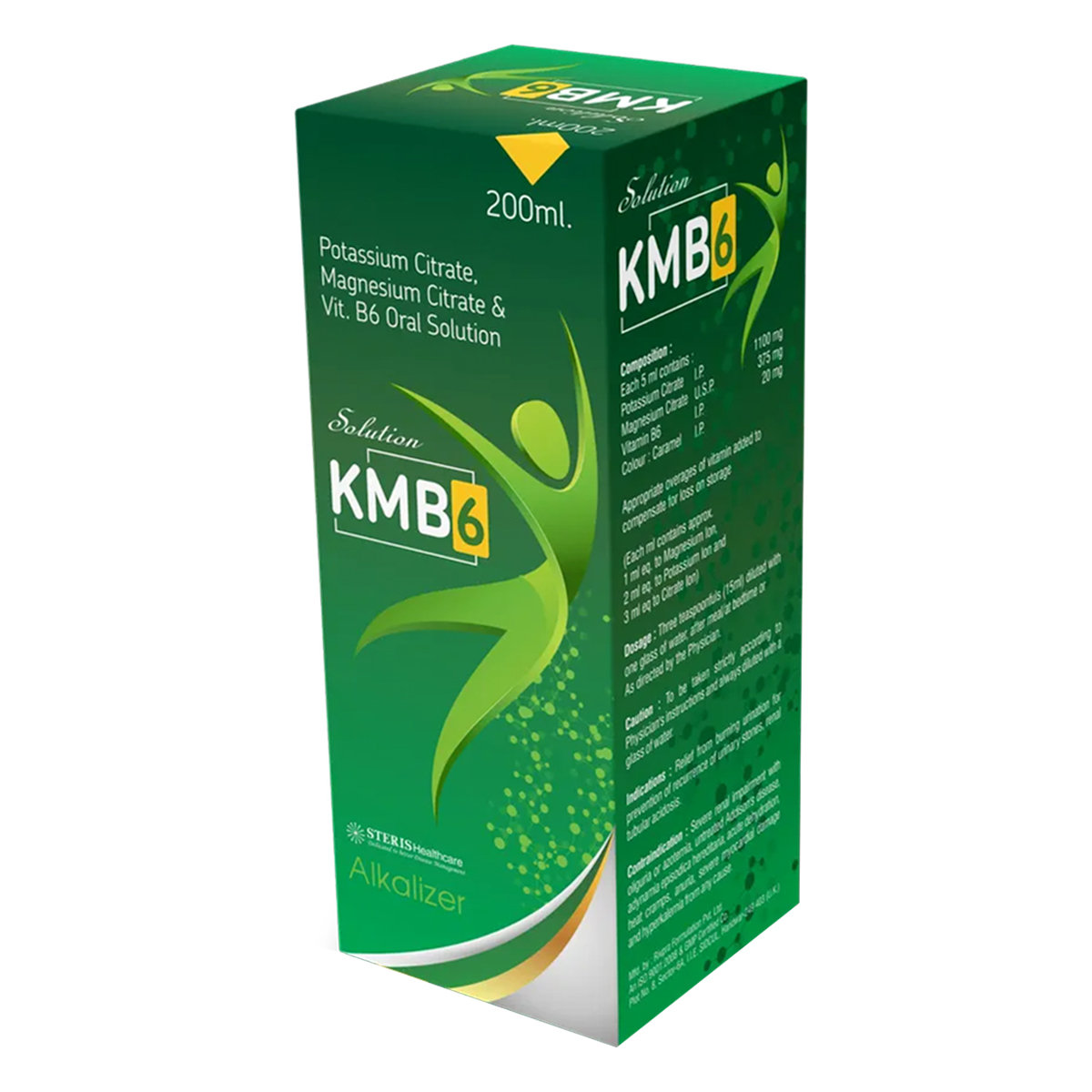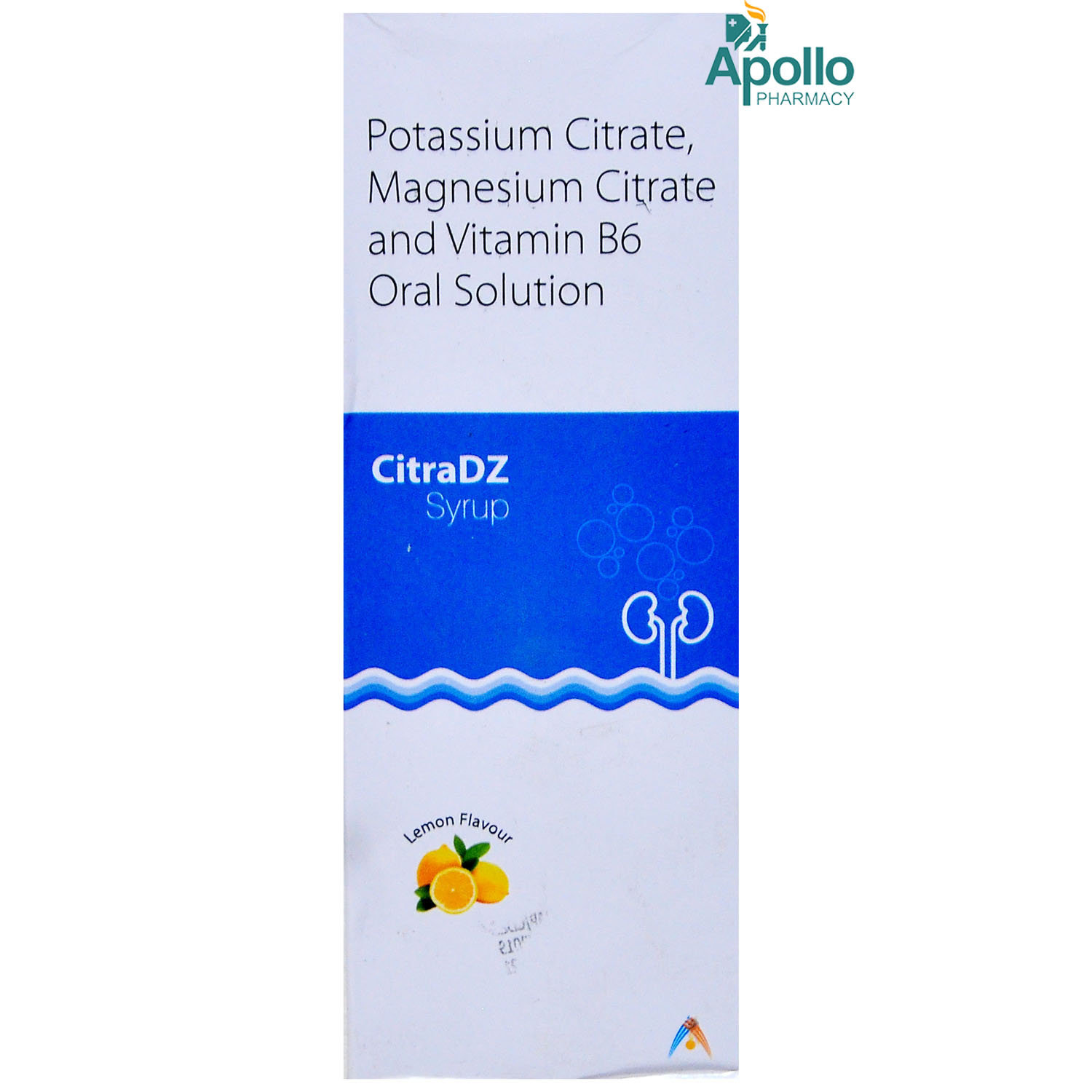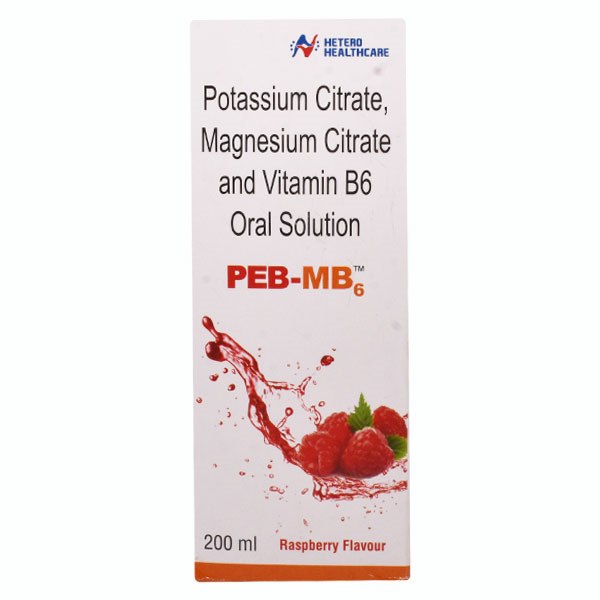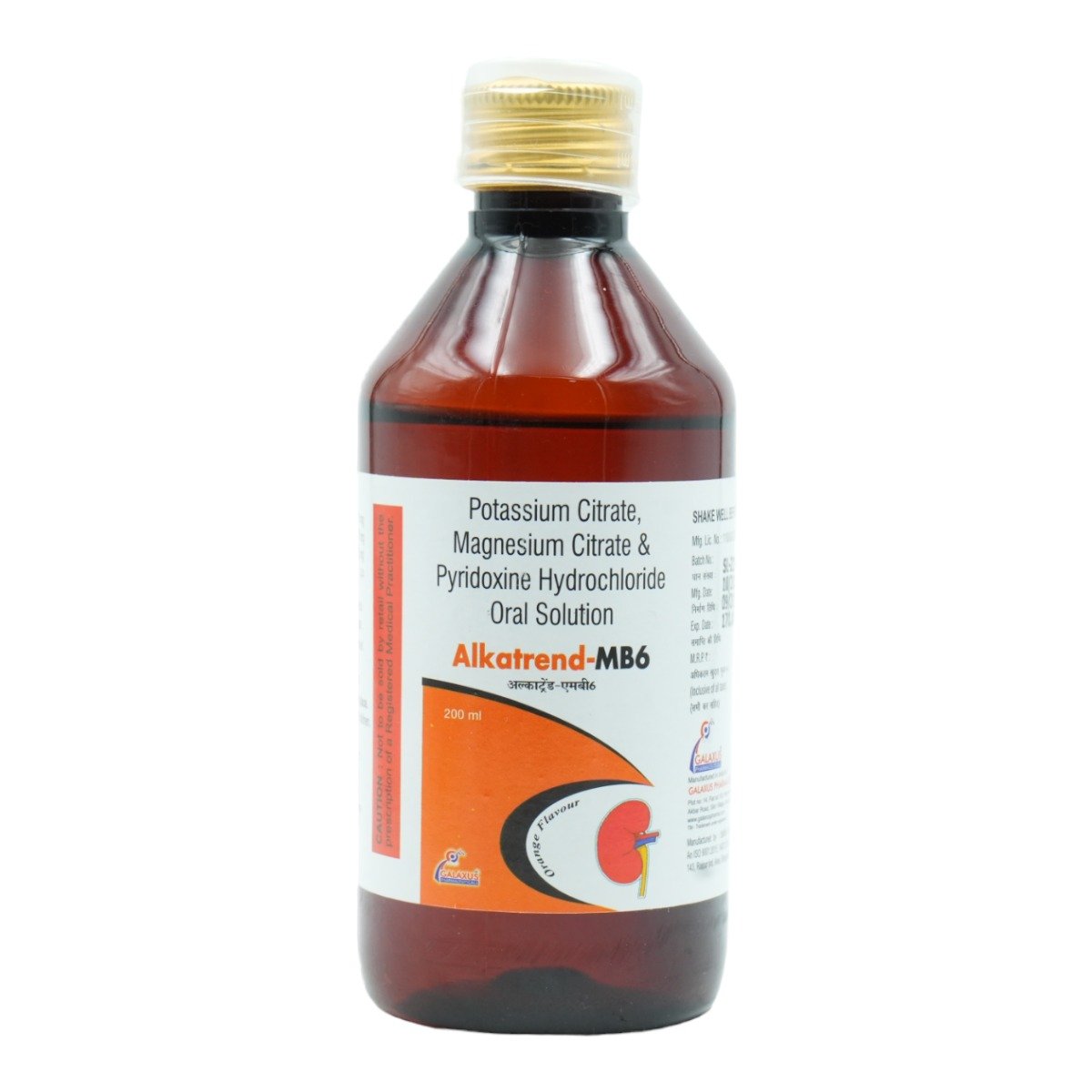Magnesium Citrate+potassium Citrate+pyridoxine
About Magnesium Citrate+potassium Citrate+pyridoxine
Magnesium Citrate+potassium Citrate+pyridoxine is indicated for the treatment of renal tubular acidosis and kidney stones. It also helps alleviate burning sensations during urination. Kidney stones are small, hard deposits made up of calcium, phosphate and other minerals/acid salts that stick together in concentrated urine. Renal tubular acidosis is a condition in which the kidneys fail to excrete acids into the urine, which causes the blood to remain too acidic.
Magnesium Citrate+potassium Citrate+pyridoxine is a combination of three drugs, namely: Magnesium citrate, Potassium citrate, and Pyridoxine. Magnesium Citrate+potassium Citrate+pyridoxine raises the urinary pH, potassium, magnesium, and citric acid levels, which prevents the crystallisation, growth, and accumulation of stone-forming salts.
You are advised to take Magnesium Citrate+potassium Citrate+pyridoxine for as long as your doctor has prescribed it for you, depending on your medical condition. In some cases, you may experience common side effects such as abdominal discomfort, diarrhoea, nausea, and vomiting. Most of these side effects do not require medical attention and will resolve gradually over time. However, you are advised to talk to your doctor if the side effects persist or worsen.
Before taking the Magnesium Citrate+potassium Citrate+pyridoxine, let your doctor know about all your medical conditions, sensitivities, and all medications you are using. And also inform your doctor if you are pregnant, planning to become pregnant, or breastfeeding. Magnesium Citrate+potassium Citrate+pyridoxine is not recommended for children as safety and effectiveness have not been established.
Uses of Magnesium Citrate+potassium Citrate+pyridoxine
Medicinal Benefits
Magnesium Citrate+potassium Citrate+pyridoxine is a combination of three drugs, namely: Magnesium citrate, Potassium citrate, and Pyridoxine. Magnesium Citrate+potassium Citrate+pyridoxine is indicated for the treatment of renal tubular acidosis, kidney stones. It prevents the recurrence of calcium oxalate nephrolithiasis (calcium oxalate stones) and uric acid lithiasis (uric acid stones) with or without calcium stones. It also helps alleviate burning sensations during urination. Magnesium Citrate+potassium Citrate+pyridoxine raises the urinary pH, potassium, magnesium, and citric acid levels, which prevents the crystallisation, growth, and accumulation of stone-forming salts.
Directions for Use
- Magnesium Citrate+potassium Citrate+pyridoxine can be taken with or without food as advised by the doctor.
- Follow your doctor's instructions on the dosage and timing of this medication to ensure safety.
- Swallow Magnesium Citrate+potassium Citrate+pyridoxine as a whole with a glass of water.
- Do not break, crush, or chew it.
Storage
Side Effects of Magnesium Citrate+potassium Citrate+pyridoxine
- Abdominal discomfort
- Diarrhoea
- Vomiting
- Nausea
Drug Warnings
Before taking Magnesium Citrate+potassium Citrate+pyridoxine, inform your doctor about all your medical conditions, allergies, and any medications you are currently using. Also, let your doctor know if you are pregnant, planning to become pregnant, or breastfeeding. Magnesium Citrate+potassium Citrate+pyridoxine is not recommended for children, as its safety and effectiveness have not been established. It is not known whether it is safe to consume alcohol with Magnesium Citrate+potassium Citrate+pyridoxine, so it is best to avoid or limit alcohol use as a precaution. To manage your condition effectively, use Magnesium Citrate+potassium Citrate+pyridoxine exactly as prescribed and for the full duration recommended by your doctor. Do not take more than the prescribed dose or use it for longer than advised, as this may lead to adverse effects.
Drug Interactions
Drug-Drug Interactions: Magnesium Citrate+potassium Citrate+pyridoxine may interact with certain HIV medications (cabotegravir, dolutegravir), certain anticancer medications (erdafitinib), certain medications used to treat anaemia caused by chronic kidney disease (vadadustat), certain antihistamines (diphenhydramine), anticholinergic drugs (atropine) and certain angiotensin II receptor antagonists (candesartan).
Drug-Food Interactions: No interactions found/established.
Drug-Disease Interactions: Magnesium Citrate+potassium Citrate+pyridoxine may interact with certain medical conditions including, UTI (urinary tract infection), dehydration, familial periodic paralysis (a group of rare, inherited disorders characterized by episodic muscle weakness or paralysis), hyperkalemia (abnormally high levels of potassium in the blood), renal dysfunction, GI irritation and malabsorption.
Drug-Drug Interactions Checker List:
Safety Advice

Alcohol
cautionIt is not known whether it is safe to consume alcohol with Magnesium Citrate+potassium Citrate+pyridoxine, so it is best to avoid or limit alcohol use as a precaution.

Pregnancy
cautionPlease consult your doctor if you have any concerns regarding this; your doctor will prescribe only if the benefits outweigh the risks.

Breast Feeding
cautionConsult your doctor if you are breastfeeding; your doctor will decide whether breastfeeding mothers can take Magnesium Citrate+potassium Citrate+pyridoxine or not.

Driving
safe if prescribedMagnesium Citrate+potassium Citrate+pyridoxine is unlikely to affect your ability to drive. However, you are advised to drive only if you are alert.

Liver
cautionLimited information is available regarding the usage of Magnesium Citrate+potassium Citrate+pyridoxine in patients with hepatic impairment. Please consult your doctor if you have liver problems or any concerns regarding this.

Kidney
unsafeMagnesium Citrate+potassium Citrate+pyridoxine might cause soft tissue calcification and hyperkalaemia in patients with renal insufficiency. Please consult your doctor if you have kidney impairment or any concerns regarding this.

Children
unsafeThe safety and effectiveness of Magnesium Citrate+potassium Citrate+pyridoxine in children have not been established.
Habit Forming
Diet & Lifestyle Advise
- Drink plenty of fluids, as they help flush out excess minerals.
- Limit salt intake. High amounts of salt can increase the risk of kidney stones.
- Maintain a healthy weight by exercising regularly.
- Avoid foods rich in oxalates, such as spinach, nuts, okra, dates, avocado, hot chocolate, cocoa, baked potato, French fries, and cereals, as they might increase the risk of oxalate stones.
- Maintain optimum levels of calcium in the body, as too little or excessive calcium can lead to kidney stones.
Patients Concern
Disease/Condition Glossary
Kidney stones: Nephrolithiasis, also known as kidney stones, is a disease affecting the urinary tract. Kidney stones are small, hard deposits made up of calcium, phosphate and other minerals/acid salts that stick together in concentrated urine. They are the common cause of blood in urine and can be painful when passing through the urinary tract. Symptoms include severe pain, usually on one side of the abdomen and nausea.
Renal tubular acidosis: It is a condition that involves the accumulation of acid in the body due to the failure of the kidneys to acidify the urine appropriately. The kidneys fail to excrete acids into the urine, which causes the blood to remain too acidic. If not treated, it could lead to kidney stones, bone disease, kidney disease or failure.
FAQs
Magnesium Citrate+potassium Citrate+pyridoxine is used to treat kidney stones and renal tubular acidosis (accumulation of acid in the body due to the failure of the kidneys to acidify the urine).
Magnesium Citrate+potassium Citrate+pyridoxine raises the urinary pH, potassium, magnesium and citric acid levels; this prevents the crystallisation of stone-forming salts.
Avoid taking Magnesium Citrate+potassium Citrate+pyridoxine if you have peptic ulcers, as Magnesium Citrate+potassium Citrate+pyridoxine has ulcerogenic potential, which could lead to further ulceration.
Diarrhoea might be a side-effect of Magnesium Citrate+potassium Citrate+pyridoxine. Drink lots of fluids and eat non-spicy food if you experience diarrhoea. If you find blood in stools (tarry stools) or if you have severe diarrhoea, consult your doctor. Do not take anti-diarrheal medicine on your own.
Consult a doctor before taking Magnesium Citrate+potassium Citrate+pyridoxine if you have an active urinary tract infection, as Magnesium Citrate+potassium Citrate+pyridoxine increases the urinary pH, which might promote further bacterial growth.
Do not discontinue Magnesium Citrate+potassium Citrate+pyridoxine without consulting your doctor. To treat your condition effectually, continue taking Magnesium Citrate+potassium Citrate+pyridoxine for as long as prescribed. Do not hesitate to consult your doctor if you experience any difficulties while taking Magnesium Citrate+potassium Citrate+pyridoxine.
Magnesium Citrate+potassium Citrate+pyridoxine may cause common side effects such as abdominal discomfort, diarrhoea, nausea, and vomiting. Most of these side effects do not require medical attention and will resolve gradually over time. However, you are advised to talk to your doctor if the side effects persist or worsen.
Magnesium Citrate+potassium Citrate+pyridoxine should be used during pregnancy only if prescribed by the doctor. Please consult your doctor if you are pregnant; your doctor will prescribe only if the benefits outweigh the risks.
Drink enough water to avoid dehydration. Include fruits and vegetables in your diet. Eat more calcium-rich foods, such as leafy green vegetables, dairy products, salmon, and sardines, and avoid stone-forming foods like spinach, rhubarb, tea, beets, and chocolate.
Do not take Magnesium Citrate+potassium Citrate+pyridoxine if you are allergic to any of its contents; if you have hyperkalaemia (high levels of potassium), chronic renal failure, uncontrolled diabetes mellitus, adrenal insufficiency, acute dehydration, oesophageal compression, delayed gastric emptying, intestinal obstruction, peptic ulcers, urinary tract infection, or renal insufficiency.
No interactions between Magnesium Citrate+potassium Citrate+pyridoxine and food have been established. However, to prevent kidney stones, you are advised to avoid foods rich in oxalates, such as spinach, nuts, dates, avocado, hot chocolate, cocoa, baked potato, French fries, and cereals. Also, avoid potassium-rich foods like bananas, apricots, almonds, beans, and potatoes.
Before starting Magnesium Citrate+potassium Citrate+pyridoxine, inform the doctor if you have any other health conditions, such as hyperkalaemia or gastrointestinal lesions, or if you are taking any other medications.
Consult your doctor before taking Magnesium Citrate+potassium Citrate+pyridoxine with other medications, such as potassium-sparing diuretics, painkillers, or antihypertensives.







